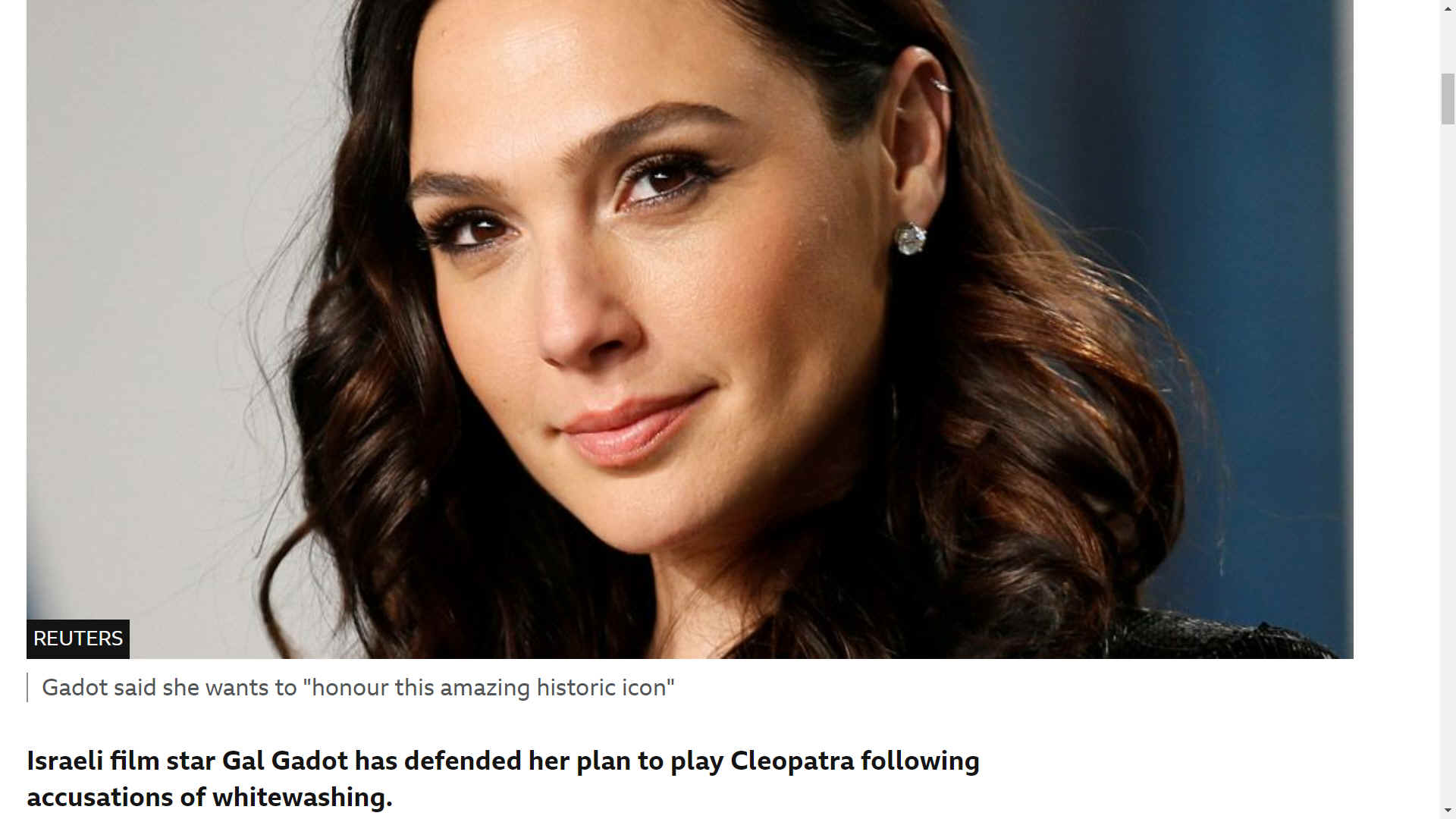
WONDER
WOMAN:
There can be no doubt that
Gal cast as Wonder Woman is superb. Better in the
explosive first episode set mostly in World War One, but the sequel is
entertaining, which is what it is all about, in which Kristen Wig and Pedro
Pascal are superb.
BBC NEWS 22 DECEMBER 2020 -
GAL GADOT DEFENDS CLEOPATRA CASTING l Gadot defends Cleopatra casting after 'whitewashing' controversy
Israeli film star Gal Gadot has defended her plan to play
Cleopatra following accusations of whitewashing.
Critics say an Arab or African actress should play the ancient Egyptian queen.
"First of all if you want to be true to the facts then Cleopatra was Macedonian," the
Wonder Woman actress told BBC Arabic's Sam Asi.
"We were looking for a Macedonian actress that could fit Cleopatra. She wasn't there, and I was very passionate about
Cleopatra."
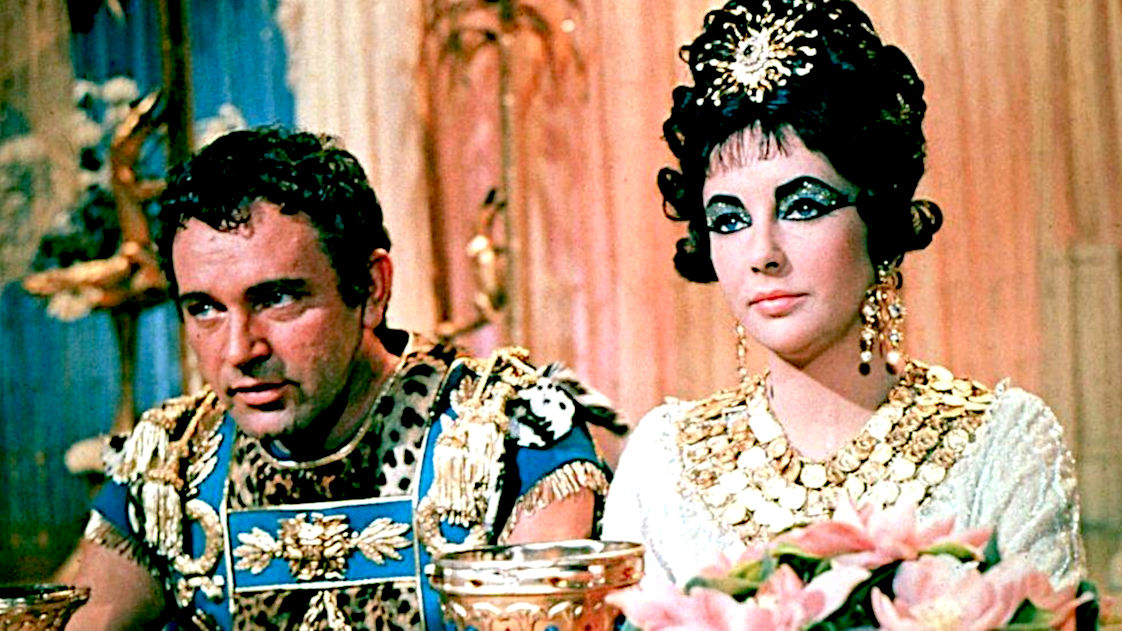
Elizabeth
Taylor was one of the most talented actors of her day. She
starred against Richard Burton, who was favoured by
Hollywood in many films, but to our mind, his performances
were rigid and monotone. Liz, on the other hand, was very
expressive and oozed sex appeal. The standard of acting
today is more demanding. As with any craft, it develops.
Along with CGI, films can be made with greater realism and
at lower cost. Indeed, that is expected by the viewing
public.
Controversy erupted in October after Gadot announced that she would star in and co-produce the film. The Guardian's Hanna Flint called it "a backwards step for Hollywood representation", while director Lexi Alexander said a black actress should be cast, citing a reconstruction of Cleopatra's face.
Gadot said: "I have friends from across the globe, whether they're Muslims or Christian or Catholic or atheist or Buddhist, or Jewish of course... People are people, and with me I want to celebrate the legacy of Cleopatra and honour this amazing historic icon that I admire so much."
She said other people were welcome to make their own films. "You know, anybody can make this movie and anybody can go ahead and do it. I'm very passionate that I'm going to do my own too."
CLEOPATRA - MACEDONIAN OR EGYPTIAN ?
Cleopatra, born in the ancient Egyptian capital Alexandria, was the last ruler in the dynasty founded by Alexander the Great's Macedonian general Ptolemy, whose descendants ruled
Egypt for 300 years.
They have long been thought to have been white with a high degree of inbreeding. But there is mystery over the identity of her mother, leading to speculation that
Cleopatra may have been of mixed heritage.
In 2008, Egyptologist Sally Ann Ashton from the Fitzwilliam Museum Cambridge created a reconstruction of her face from images on ancient
artefacts. It showed her with mixed ethnicity.
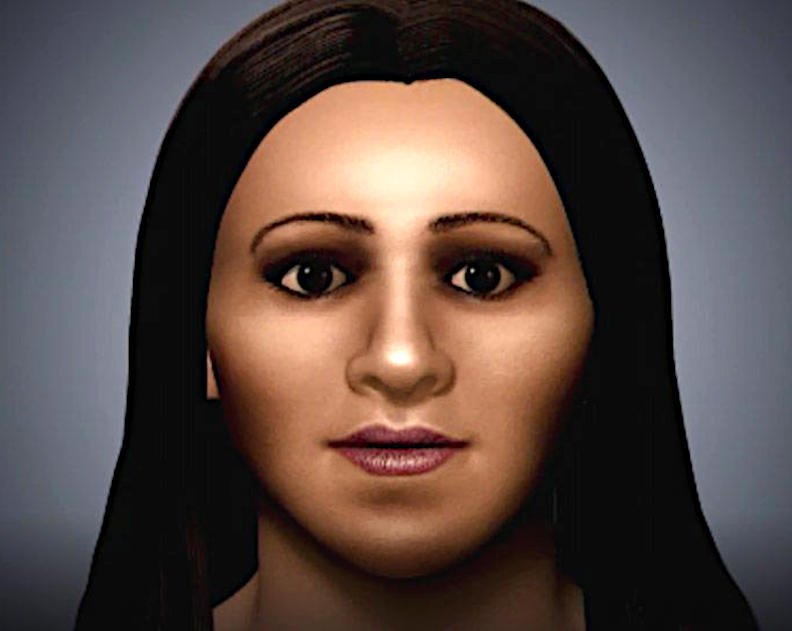
Cleopatra
was of Macedonian descent, as were all Ptolemaic rulers who
lived in Egypt. Not knowing who her mother was, is part of
the puzzle that allows some leeway, when it comes to casting
for films. Plus the fact that white or not, all humans
respond to sunlight by increasing the melanin in the skin. Tanning takes place in the skin's outermost layer, the epidermis. About five percent of the cells in your epidermis are special cells called melanocytes.
About 5 million of them. We all have the same number of
these cells. Copper
and vitamins
C and E
can improve the ability of the body to defend against
harmful ultraviolet rays, essential in a location like
Egypt.
"She probably wasn't just completely European," Dr Ashton told The Daily Mail at the time. "You've got to remember that her family had actually lived in Egypt for 300 years by the time she came to power."
The following year, a BBC documentary about the discovery of the possible skeleton of Cleopatra's sister Arsinoe suggested she may have had mixed ancestry.
But earlier this year, Kathryn Bard, Professor of Archaeology and Classical Studies at Boston University, told Newsweek:
"Cleopatra VII was white - of Macedonian descent, as were all of the Ptolemy rulers, who lived in Egypt."
The celebrated queen has been played on screen by a string of white actresses, most famously
Elizabeth Taylor in the big-budget 1963 film.
At
the other end of the scale, we have Adele
James in Jada
Pinkett-Smith's African Queens, Netflix,
Docuseries. Where they are accused of blackwashing.
The problem being they include a documentary element in that
television streamed series. If they had just come out and
said 'fictional series,' it would have been taken as
fiction. But, to include a documentary element, and then use
a drama to try to argue that (probably) the most famous
female ruler of all time was black. Is seen by some as Afrocentric
propaganda. This has nothing to do with the acting quality,
save that the lead must have known, as with the producer,
the impact such a television programme would have. And it
did. It sparked uproar.
You
may think that, Gal Gadot is (probably) better suited to the
part, ethnicity wise, than Elizabeth
Taylor. And many might think Gal could pull that off.
For sure, Liz Taylor, had the acting skills to give an
extremely credible performance, even if she was (as is yet
to be proven) a shade on the light side. But then, Elizabeth
was in movie, not claiming to be an educational broadcast.
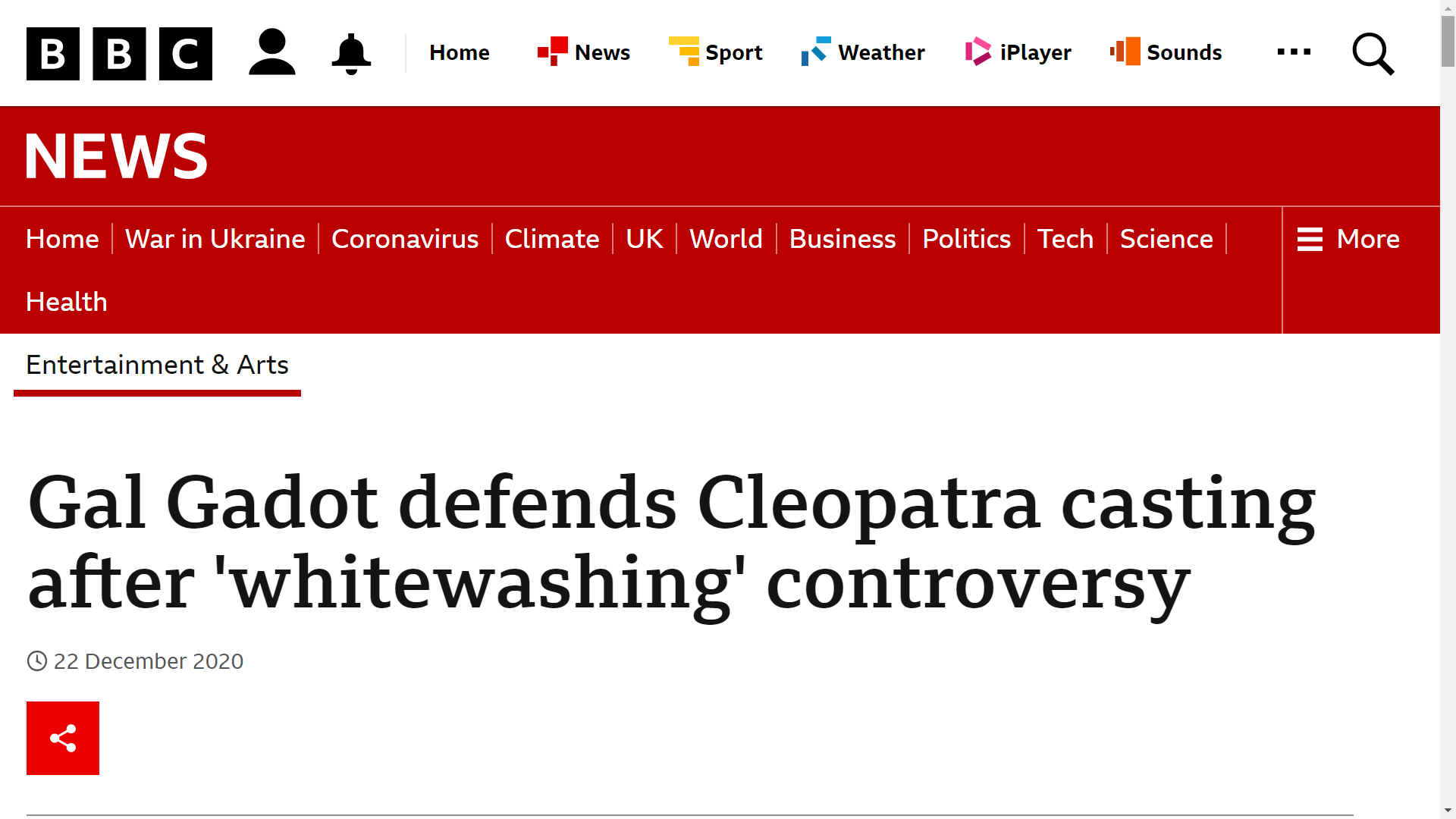
WHITEWASHING:
Whitewashing in film is the practice in which white actors are cast in historically non-white roles, potentially downplaying the significance and roles of other cultures. Excepting of course that such films telling those stories might never see the light of day, without a named actor as the draw. Nobody wants to make a film that loses money.
People claim that non-black minorities are the biggest victims to whitewashing,
where Asians, Native Americans and Polynesians are not allowed to be the heroes of
their own stories, with roles frequently given to white actors in makeup to appear more ‘ethnic’, or
even where the entire cultural identity is removed from the story.
Though that infrequently happens today, with languages
spoken to accurately portray the nationality represented
(with English subtitles) for greater immersion into a film.
The plain fact is that actors of all cultures are now making big box office, including Gal
Gadot, Wesley Snipes, Denzel Washington, Irrfan Khan, Hal Berry,
and Jet Li, all of which cultural diversity add to the realism and draw of a movie.
For those putting their money where their mouth is, they should benefit from artistic license in casting and interpretation of stories. Film making is about entertainment and education. Acting is about portraying someone you are not. A great performance in a movie shouldn’t be downplayed by whitewashing allegations.
In the case of Cleopatra, nobody is sure exactly what she
looked like, or her ethnic makeup. We just know she is of
mixed race (are we not all in a global world), frequently a
devastating combination.
We
also know that she was exceptionally well educated, with the
skill (and presumably attributes) to be able to seduce men
of great power. It is thus for a producer and the movie
backers to research as far as possible, and make a suitable
choice for their film to succeed. In 1963 Elizabeth Taylor
was a good bet. Today, the viewing public would anticipate
an actor able to make them believe, and so enjoy the part, regardless
of race or color, provided any disparity was mitigated. Ms
Gadot, could well be suited to the part.
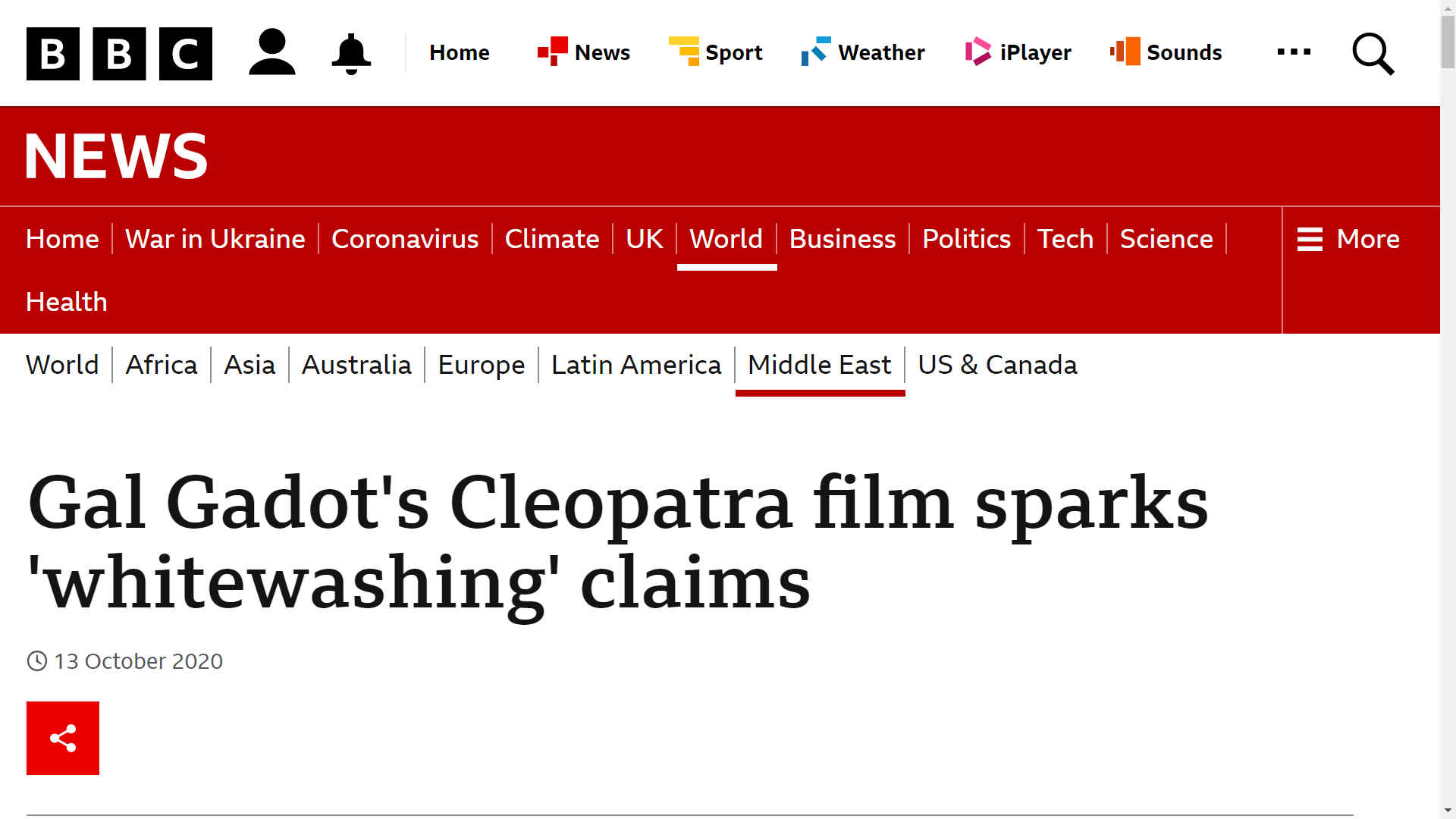
BBC
NEWS 13 OCTOBER 2020 - GAL GADOT'S CLEOPATRA FILM SPARKS
WHITEWASHING CLAIMS
Plans for a new movie about Cleopatra have sparked a controversy before filming has even started.
The role of the famed ancient Egyptian ruler is to be played by Israeli actress Gal Gadot, best known for her Hollywood depictions of Wonder Woman.
The announcement has led to a row on social media with some alleging "cultural whitewashing", where white actors portray people of colour.
Some have said the role should instead go to an Arab or African actress.
Cleopatra was descended from an Ancient Greek family of rulers - the Ptolemy dynasty. She was born in Egypt in 69BC and ruled the Nile kingdom when it was a client state of Rome.
The row reflects a growing debate in Hollywood over casting and identity, and whether actors should play characters of different ethnicities to themselves.
Writer on Africa, James Hall, said he thought the filmmakers should find an African actress, of any race.
US writer Morgan Jerkins tweeted that Cleopatra should be played by someone "darker than a brown paper bag" as that would be more "historically accurate".
"Gal Gadot is a wonderful actress, but there is an entire pool of North African Actresses to pick from. Stop whitewashing my history!" posted another user..
Other social media users argued that Cleopatra was more Greek or Macedonian than Arab or African.
The row over Gal Gadot as Cleopatra draws on contemporary arguments over national culture, religion and gender politics.
But the ancient Middle East wouldn't conform to many of our modern views of identity.
Cleopatra was on the throne well before Christianity, for example, and centuries ahead of the Arab conquests of North Africa - she was the last of the Ptolemaic rulers; born in Egypt, descended from Ancient Greeks and dominated by Rome.
But there are plenty more problems with popular depictions of the ancient Nile Queen - often cast as a powerful seductress replete with a sensual, oriental mystique.
That image - including Elizabeth Taylor's famous portrayal - is likely a myth handed down to us by Latin love poets years after Cleopatra's death.
The thousands of depictions of her through the ages are "based on a perilous series of deductions from fragmentary or flagrantly unreliable evidence" according to the British historian Mary Beard.
So little is really known, she adds, that Cleopatra should appear to us today as "the queen without a face".
Israeli commentators suggested some criticism was based in anti-Semitism.
The Jerusalem Post journalist Seth Frantzman said it made no sense to exclude Jews from playing roles from the Middle East, "when Jews are primarily a people from the Middle East either with distant or recent roots.
"The idea that casting should exclude Jews is shameful and shows a lack of education for the commentators," he said.
Israel's embassy in Washington tweeted: "One icon playing another! Excited for this new take on Cleopatra!"
Gal Gadot's spokesperson (most sensibly) declined to comment on the row.
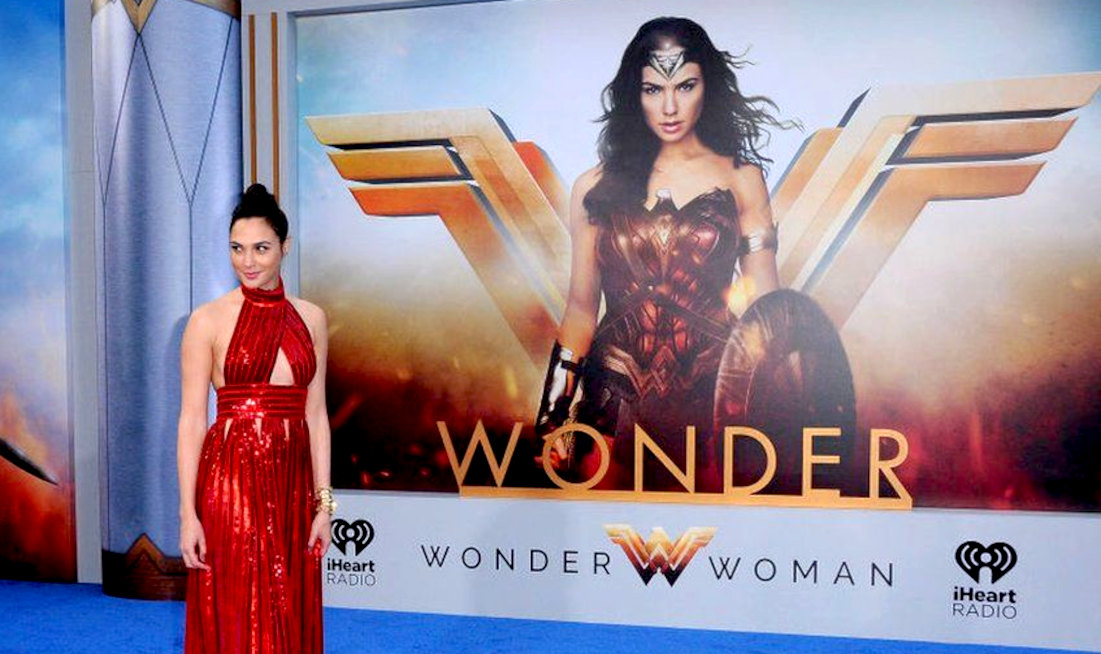
The
first Cleopatra movie was made in 1917. It was silent.
The
second Cleopatra by Cecil B DeMille, movie starred Claudette
Colbert in 1934, a runaway box office success. The third
starred Elizabeth
Taylor, with good initial box office, but ultimately a
studio flop money wise in 1963. Any way you look at it, a
conventional re-make, could be a risky venture, and we take
our hat off to Gal Gadot, who must be very passionate about
the part. In which case, it is only money!
REFERENCE
https://www.bbc.co.uk/news/world-middle-east-54529836
https://www.bbc.co.uk/news/world-middle-east-54529836
https://www.bbc.co.uk/news/entertainment-arts-55409187
https://www.bbc.co.uk/news/entertainment-arts-55409187

'CLEOPATRA'S MUMMY' - UNDER DEVELOPMENT
'Cleopatra's
Mummy' is one of a trilogy in the John Storm
franchise of
ocean awareness adventures, featuring the incredible solar
and hydrogen powered trimaran: Elizabeth
Swann. 'Cleopatra The Mummy,' the prequel to 'Kulo-Luna,'
or Treasure Island.
The order of production could be to suit identified gaps in
entertainment, in any particular year. Equally, the trilogy,
could be adapted for network television. An example of which
is Blood
and Treasure.